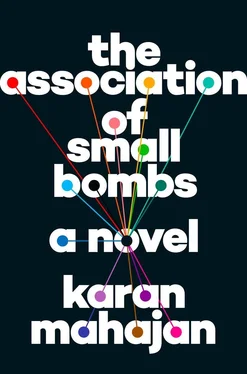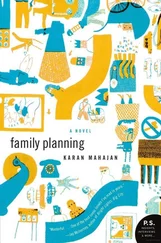The way the association was structured — dependent, in a way, on the inflow of victims — also made the Khuranas perversely eager for new bombings. Soon after they heard about the blast in Sarojini Nagar on TV, they headed to the hospital.
________
It was in the hospital, amid the chaos and stinking blistered bodies and nurses pushing trolleys full of IVs and bottles and news crews thuggishly infiltrating the wards, that Deepa and Vikas met Ayub, though they had no idea who he was. He lay in a bed with a patch over his left eye and legs tightened in bandages. The blast had caused lots of lower-extremity injuries, the doctor said, talking to the Khuranas, but this particular man had been spared the worst. Instead a piece of shrapnel had bounced up and penetrated his left eye; the bomb had been packed with industrial nails and ball bearings. “Many of these people,” he said, gesturing around the room, “have wounds that look like bullet holes.”
“Better to have lower- than upper-extremity injuries,” Vikas said.
The doctor looked at Vikas as if to say, “You know a lot,” but then, pointing to Ayub, went on, “He’ll be fine. If he had been closer he would have died instantly of an internal hemorrhage, so you’re lucky.” The Khuranas had pretended they were relatives of this boy on the bed. This was their usual ploy to get access to hospitals right after a blast.
What was it about such a morbid war zone that energized Vikas? Once, on a trip to France to screen a documentary at the Aix-en-Provence film festival, Vikas had peeled off and visited a chateau in the Loire Valley. Stony and hard skinned, the chateau consisted of two towers connected by a covered bridge that ran over a river. During the Great War, his guide had told him, the battling armies shared the bridge as a common hospital. Vikas had been stunned by the idea of wounded soldiers — who may have wounded each other — lying bed-to-bed in the same ward. What horrified him was the fact that injury, its violent horizontal stasis, revealed the complete artificiality of war.
He remembered seeing Tushar and Nakul in the morgue and thinking: They belong to a different class now. The class of the dead.
He had never lost his urge for classification — this tyrant’s urge for unity and separation. He knew everyone was different, yet he wanted them to be the same. Hence his obsession with death.
Vikas had always been obsessed with death. In his youth, it had taken the form of constant anxiety and brooding, and he had always been fascinated by Deepa’s star-crossed past, the way so many of her relatives had died young. And maybe he had taken satisfaction in the ruin of his own life, the way in which death had washed over him in an equalizing wave. Maybe if he had not thought so much, worried so much about death, it would not have come for him.
And yet, death could not get him now. Everything had been taken away from him. Even his wife, to a degree, was gone; he knew (vaguely) that he didn’t have her completely. He had made himself immune to the only disease without a cure.
Mansoor heard about the blast the day it happened, but he didn’t learn that Ayub was among the injured till he saw his face a day later on TV — Ayub, swaddled in blankets, on a rusted bed, croaking a few words into the microphone, the groove above his nose deepening; then Vikas Uncle (of all people!) taking over the proceedings with his trademark fluency and rapid-fire way of speaking. “The government has promised compensation,” he said. “But so far no one has even visited these people in the hospital. Nor has the emergency protocol changed and improved — it took two hours for an ambulance to come to Sarojini Nagar and then too it was not equipped with the right emergency machines.”
“Mama,” Mansoor said, muting the TV.
“Yes, beta,” she said from the other room.
“Something very bad just happened.”
________
When his mother saw Ayub on TV minutes later, the news segment recycling itself, she shook her head sadly, but also, Mansoor felt, not urgently or empathetically enough.
“I’ve had a feeling that something bad was about to happen,” Afsheen said. “I’ve been having headaches.” Tears sprang to her eyes. “Do his mother and father know?”
“I don’t know if anyone knows,” Mansoor said. “If he knows. I should go right away to the hospital. But it’s good that Vikas Uncle and Deepa Auntie are there. Poor fellow — he’s about to get married, and Papa said he came only two days ago to the office and was wondering why he hadn’t phoned.” He could understand now, in a way he couldn’t before, the point of Vikas Uncle and Deepa Auntie’s association. He hadn’t known they got involved this early in a bomb’s unraveling.
His mother insisted on coming along with him to the hospital and he didn’t refuse.
In the car, Mansoor, resting against the door, marveled at the oddness of the situation — the way in which life had come full circle, so that he was the well one now, with strong arms, a skullcap on his head, a prayer on his lips, visiting someone else who’d been injured in a blast. He must have met thousands of people over the course of his life and none, save for Tushar and Nakul, had been injured or killed in a blast. Ayub, as the poorest of his friends, was the most likely to end up in a public space overrun with flames.
Of course, by the time Mansoor got to the hospital, propelled forward in his car by the driver, the city comforting him with its exciting colors and music — the soundtrack to Godzilla on the stereo casting its own spell — he’d forgotten all about this circularity and was taken up with parking, finding the reception desk, moving to the right ward, behaving like an adult to the correct degree. His mother was beside him, covering her mouth, put off by the hospital.
“I was also in a hospital like this and I was OK,” Mansoor said, referring to his first visit to the hospital after the blast to get the shrapnel out of his arm.
“But you didn’t stay in the hospital, beta. We took you home. These days a lot of antibiotics are being dumped in our rivers — I’ve read drinking river water is like drinking Crocin. All the bacteria are resistant to medicine. You should cover your nose. Most people die in these hospitals from staph infections and pneumonia.”
You should have been a bloody doctor, he thought, but kept his mouth shut. He noticed people staring at him because of the skullcap and broadened his chest in defiance.
Passing through the ICU, they found Ayub lying on his own bed (most of the other victims were doubled or tripled, head to foot, on beds). “Ayub bhai,” Mansoor said.
Ayub smiled weakly from his metal bed and held out a bandaged hand. He did not actually feel so weak anymore but knew it was crucial to act the part. After the explosion, the pain, the loss of his left eye, which had sliced the world in half, tunneled it, he’d woken up in the hospital surprised and frightened — though he’d been told, during training, that such an outcome was far from extraordinary. Terrorists were always being blown up by their own bombs; if he were injured, he’d been told, he was to play a confused victim and supply a Hindu name.
Now he waited, in panic, for communication from Shockie or Tauqeer.
“Do you know they’re calling you Mr. Galgotia?” Mansoor asked. (Ayub had named himself after his favorite bookstore, Galgotia & Sons.)
“They’re confused about everything.” Ayub waved it away. “Hello, auntie.”
“Hello, beta,” she said. After ascertaining he hadn’t talked to his parents, she said, “Do you have your mummy and papa’s phone number? We should call them. Otherwise your pain’s under control? We can make arrangements to transfer you to a private room.”
Читать дальше












